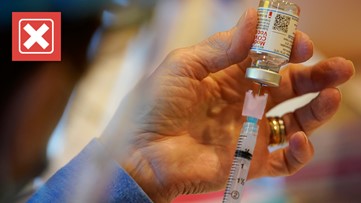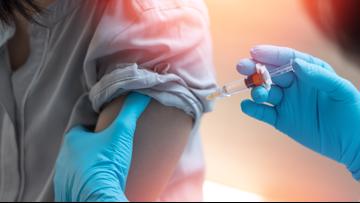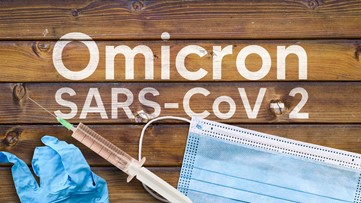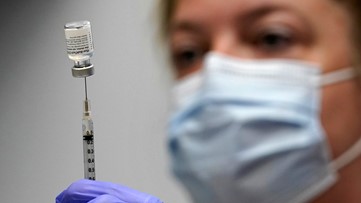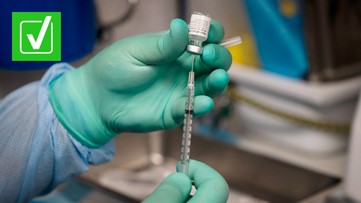UPDATE: On Friday, April 23, the CDC's Advisory Committee on Immunization Practices (ACIP) voted to resume use of Johnson & Johnson's COVID-19 vaccine in the U.S. for individuals over the age of 18 under the FDA'S Emergency Use Authorization.
Original report published on April 22, 2021:
Johnson & Johnson announced on April 13 it was “aware of an extremely rare disorder involving people with blood clots in combination with low platelets in a small number of individuals” who received its COVID-19 vaccine in the United States. The type of blood clot is called cerebral venous sinus thrombosis (CVST), which is a rare form of stroke.
Further research showed that this discovery impacted six women out of the more than 6.8 million people in the U.S. who have received Johnson & Johnson’s one-dose vaccine, according to the U.S. Centers for Disease Control (CDC) and Food and Drug Administration (FDA). This led the health agencies to pause the Johnson & Johnson vaccine rollout temporarily in the U.S. out of an abundance of caution.
Following this development, VERIFY viewer Marilyn Schroder asked, “Is the Johnson & Johnson vaccine causing CVST problems outside the United States?”
THE QUESTION
Is the Johnson & Johnson vaccine causing cerebral venous sinus thrombosis (CVST) problems outside the United States?
THE SOURCES
THE ANSWER
No, while other countries temporarily paused their Johnson & Johnson vaccine rollouts, there have been no reported cases of CVST outside of the United States in relation to the Johnson & Johnson single-dose shot.
WHAT WE FOUND
Cerebral venous sinus thrombosis, or CVST, “occurs when a blood clot forms in the brain’s venous sinuses.” The clot keeps blood from draining out of the brain, and as a result, blood cells may break and leak blood into the brain tissues, causing a hemorrhage, according to a definition found in the University of Rochester Medical Center Health Encyclopedia.
In a joint statement released on April 13, the CDC and FDA said in the cases connected to the Johnson & Johnson vaccine in the U.S., the symptoms impacted six women between the ages of 18 and 48, and occurred six to 13 days after they were vaccinated.
“In these cases, a type of blood clot called cerebral venous sinus thrombosis (CVST) was seen in combination with low levels of blood platelets (thrombocytopenia),” the CDC and FDA said. “Right now, these adverse events appear to be extremely rare.”
Johnson & Johnson announced that same day that the company had made the decision to “proactively delay the rollout of our vaccine in Europe and pause vaccinations in all Janssen COVID-19 vaccine clinical trials while we update guidance for investigators and participants.”
After these announcements were made, South Africa’s Minister of Health, Dr. Zwelini Mkhize, released a statement saying that while the country had “inoculated 289,787 health care workers” with the Johnson & Johnson vaccine, they “have not had any reports of clots that have formed after vaccination.”
“After this advisory came to my attention, I held urgent consultations with our scientists, who have advised that we cannot take the decision made by the FDA lightly. Based on their advise [sic], we have determined to voluntarily suspend our rollout until the causal relationship between the development of clots and the Johnson and Johnson vaccine is sufficiently interrogated,” said Mkhize. “Given the preliminary literature on hand, our scientists are confident that the FDA’s decision is on a precautionary basis and we expect that this will not result in the complete withdrawal of the Johnson and Johnson vaccine from the vaccination armament.”
The South African Health Products Regulatory Authority (SAHPRA) recommended on April 17 that the country should lift its pause on administering the Johnson & Johnson vaccine after specific conditions were met, such as “strengthened screening and monitoring of participants who are at high risk of a blood clotting disorder.”
On April 20, the European Medicines Agency’s (EMA) safety committee held a meeting and concluded that “the reported combination of blood clots and low blood platelets is very rare, and the overall benefits of COVID-19 Vaccine Janssen [Johnson & Johnson] in preventing COVID-19 outweigh the risks of side effects.”
The EMA, which is the European Union’s (EU) drug regulatory agency, also noted that Johnson & Johnson should add a warning label to the product information on its COVID-19 vaccine about unusual blood clots with low blood platelets.
Following the EMA’s recommendation, Johnson & Johnson said that it will update its COVID-19 vaccine product information “to include important information on the diagnosis and management of this very rare adverse event.” The company also announced that it would resume shipment of the vaccine in the EU, which includes 27 European countries, along with Norway and Iceland.
In Latin America, so far, Brazil, Chile, Colombia, Peru and Mexico have contracted the Johnson & Johnson vaccine, however no doses have been administered to individuals yet, according to data compiled by the Americas Society / Council of the Americas (AS/COA).
The CDC and FDA are currently reviewing the reported cases in the U.S. and plan to reconvene on April 23 for further discussion, according to Johnson & Johnson.
More from VERIFY: AstraZeneca vaccine still recommended and being tested as blood clot reports are investigated
VERIFY
Our journalists work to separate fact from fiction so that you can understand what is true and false online. Please consider subscribing to our daily newsletter, text alerts and our YouTube channel. You can also follow us on Snapchat, Twitter, Instagram or Facebook.



